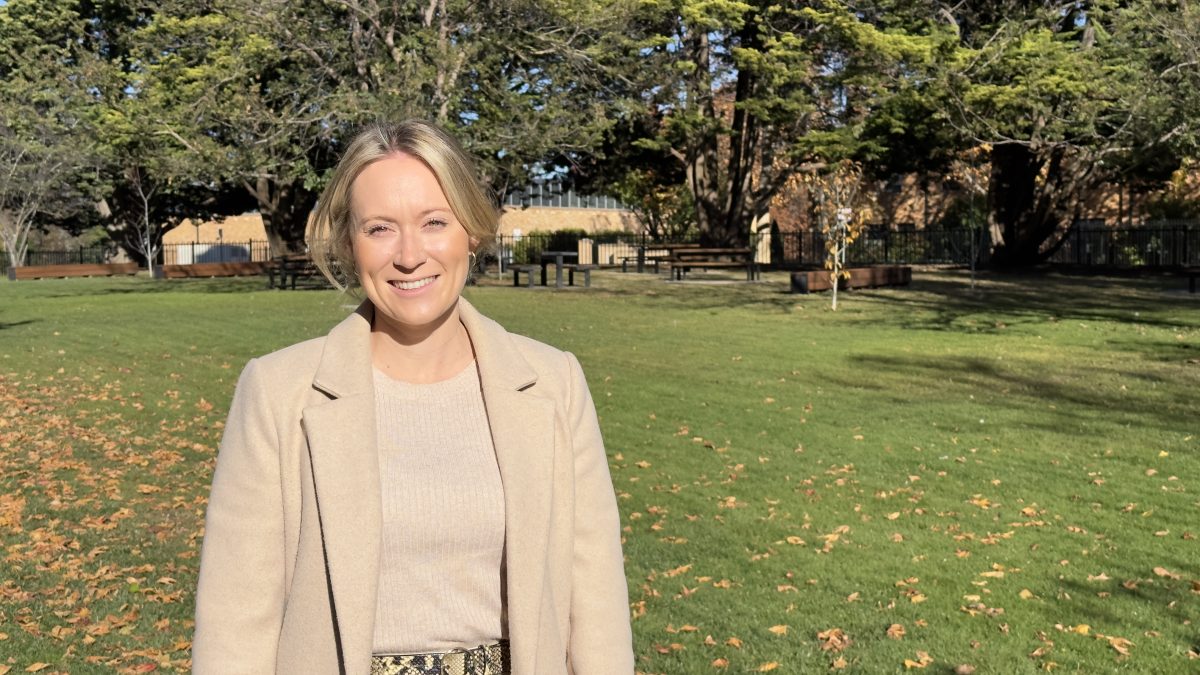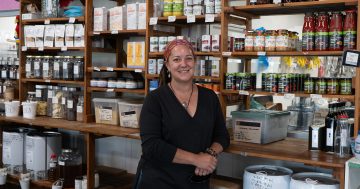
St Clare’s College leader of learning technologies and hospitality and food tech teacher Ellie Rowland says the college is on “cloud nine” after having the grant approved. Photo: Travis Radford.
St Clare’s College has been granted $20,000 by the ACT Government to build a paddock-to-plate garden on its Griffith campus to teach students where food comes from and how it’s produced.
The garden was the brainchild of St Clare’s leader of learning technologies and hospitality and food tech teacher Ellie Rowland who was raised in Young, two hours north-west of Canberra.
“I grew up with my mum having four veggie gardens [and] being out in the garden each week [and] dad producing his own cattle and sheep,” she said.
“We would then butcher and have all of our own homegrown meat, as well as veggies and bits and pieces [and] we’d rarely go to the shops to buy stuff.”
Ms Rowland said she wanted her students to learn where food came from and how it was produced then cooked, as she had as a child in Young.
She established a vegetable garden on-campus three years ago but it was taken down to make way for the development of a new building.
However, Ms Rowland said her vision for the new paddock-to-plate garden was bigger and better than the last and included using native Australian produce.
“Given the substantive amount of money, our vision is quite big and hopefully it will be something that [can] support at least three to four classes … to produce and grow food and then use within those kitchens,” she said.
“I’m hoping for about four large garden beds in an enclosed shelter, [an] irrigation system so it’s self-sustainable over our school holidays, as well as a greenhouse to propagate our own seedlings.”
Ms Rowland said she was also driven by her “passion for sustainability” and hoped the garden would allow the college to reduce the amount of produce it was purchasing from suppliers.
She expected development of the garden would be underway by term three of the school year but a community consultation period would be the focus until that time.
“We’ve got to have all of our stakeholders involved. That’s parents, teachers and students [so we’re] building that shared vision with them all,” she said.
Ms Rowland also invited Canberrans with knowledge about growing native produce to participate in the consultation process.
“I will happily take on board all the advice and we’d love to build a team that we can work with,” she said.
St Clare’s College was one of six organisations to receive a portion of $155,000 distributed under the sixth round of the government’s Community Zero Emissions Grants program.
Minister for Water, Energy and Emissions Reduction Shane Rattenbury said the grants would support the Canberra community to deliver local solutions to address climate change.
“We are in a climate crisis. Responding to this crisis requires action at all levels, and these grassroots grant-funded projects have the potential to reach a broad cross-section of our community,” he said.
“The ACT Government is committed to climate change action through its key policies of: net zero emissions by 2045; transitioning to an all-electric city; and phasing out fossil-fuel vehicles.
“The community has a key role to play in all of these policies.”
The other five grants distributed under the program include: $49,798.88 for Canberra Environment Centre’s Adapt for Climate Toolkit 2.0; $39,500 for Asthma Australia Limited’s ACT AirSmart Program; $8020 for Canberra City Farm’s CCF Composting Shredder; $22,280.24 for Australian National University’s Worms Against Waste; and $15,620.71 for The Food Co-operative Shop’s Zero Emissions Kitchen.
If you are interested and believe you are eligible to provide input into St Clare’s College’s paddock-to-plate garden, please contact Ellie Rowland at ellie.rowland@stcc.act.edu.au.














